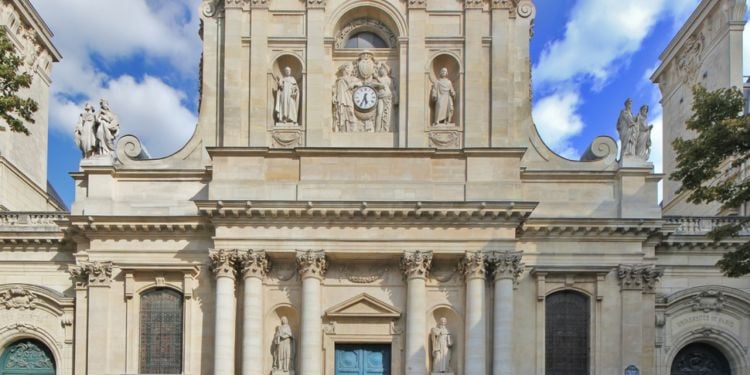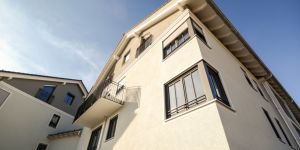
Studying in Paris provides an unparalleled academic experience. The city boasts some of the world's most prestigious educational institutions, ensuring access to excellent teaching and exceptional resources. Beyond academics, Paris is a cultural hub, offering immersion in art, gastronomy, and history. Networking opportunities are abundant, and access to internships and professional opportunities is readily available. In summary, there are numerous compelling reasons to choose Paris for your studies!
France is home to 75 public universities, all partially subsidized by the government. This ensures that students from diverse backgrounds have access to a rigorously regulated, high-quality education system. You can also find courses in multiple languages in Paris, from undergraduate to graduate levels!
Private universities in France
Tuition fees at private universities are typically higher than those at public universities, generally ranging from 2,000 euros to over 17,000 euros per year, depending on factors like enrollment year and academic level. Some private universities and business schools are highly prestigious with excellent reputations, so it's essential to thoroughly research your chosen institution before applying.
Remember that French universities are based on the European Credit Transfer System (ECTS). In short, your studies in France and your French diploma will be recognized by European universities.
The best universities in Paris
École Normale Supérieure de Paris (ENS)
The ENS de Paris is a Grande école (elite, selective institutions whose graduates reach the highest levels of the French public and private sectors) and a university. The ENS is part of the Paris Sciences et Lettres (PSL) research university, created in 2010 under the impetus of France's grandes écoles and research centers. The ENS is an institution of excellence, offering a wide range of courses leading to internationally recognized degrees in fields such as biology, chemistry, computer science, geosciences, mathematics, physics, cognitive science, economics, geography, history, theoretical arts, languages, ancient sciences, diplomacy, and geopolitics, to name but a few. The ENS prepares its students for privileged positions in public administration. At the same time, its research center is a world-renowned institution with some 800 researchers working in collaboration with leading research organizations around the globe.
The ENS allows foreign students to apply according to selective eligibility criteria. Once you meet these criteria, you'll still have to pass the written and oral tests that determine whether or not you can continue your studies at the ENS. Naturally, the university offers courses in English. However, a reasonable level of French is highly recommended for arts and social science courses. Moreover, the ENS provides international students with a monthly stipend and accommodation on one of its three campuses. Find out more about the ENS by clicking here.
Paris-Saclay University
While Université Paris-Saclay offers courses in marketing, economics, human resources, and other subjects, its primary focus remains on the scientific field. Disciplines such as chemistry, computer science, biology, pharmaceuticals, medicine, environmental studies, energy, earth sciences, materials science, electronics, and mechanics are particularly prominent. Paris-Saclay is especially renowned for its research excellence in mathematics and physics, producing two Nobel Prize winners: Pierre-Gilles de Gennes in 1991 and Albert Fert in 2007.
The university welcomes international students interested in exchange programs. However, it emphasizes that apart from its "international courses" available for Masters and PhD students, all other programs are conducted exclusively in French. Therefore, it is essential to have a proficient level of French, even though a formal language proficiency test is not mandatory. For further details about the University of Paris-Sud, please click here.
Paris 1 Panthéon-Sorbonne University
Paris 1 Panthéon-Sorbonne hosts nearly 45,000 students and specializes in humanities and social sciences. It offers diverse fields of study, including visual arts, cinema, law, economics, geography and development, management, history, art history, philosophy, political science, and social sciences. Additionally, the university provides mathematics education and a Bachelor's program focusing on business, environmental management, tourism, hospitality, and catering. It particularly excels in archaeology.
Paris 1 Panthéon-Sorbonne is a popular choice for international students. The university offers a variety of courses taught entirely or partially in English. While it doesn't offer direct scholarships to international students, it provides information on external funding opportunities. Its campuses are spread across Paris and its suburbs. For more information about Université Paris 1 Panthéon-Sorbonne, click here.
École des Ponts – ParisTech
Formerly known as the École des Ponts et Chaussées, ParisTech is a vast engineering school. Its alumni include Henri Becquerel, who won the Nobel Prize in Physics. Through its 12 research laboratories, École des Ponts is deeply involved in the challenges presented by the modern world and develops Master's and PhD courses tailored to subjects including environmental science, urban management, transportation, and more. Various types of funding are available for international students: mobility grants, travel assistance, loans, and more. École des Ponts requires at least a B1-level diploma in French. If you don't meet this criterion, you'll need to take French courses to improve your skills. École des Ponts is located in Champs-sur-Marne, a suburb of Paris. Find out more about École des Ponts.
Paris Cité University
Formerly known as Université Paris-Diderot (Paris 7), Université Paris Cité is situated in the 13th arrondissement of Paris. Established in 2020 through the merger of Paris Diderot and Paris Descartes universities, it is a multidisciplinary institution offering a wide range of programs in health sciences, languages, psychoanalysis, history of science, art, computer science, and more. The university is renowned for its excellence in mathematics and is actively engaged in research, particularly in neuroscience, oncology, and hematology. For more information about Université Paris Cité, click here.
Paris Dauphine University
Université Paris Dauphine specializes in organizational and decision sciences, emphasizing multidisciplinary education. It was the first French university to receive EQUIS accreditation, a global recognition in educational management systems. It excels in statistics, operations research, applied mathematics, law, economics, management, social sciences, IT management, and journalism. Paris Dauphine has established partnerships with numerous international universities and welcomes foreign students regardless of their university affiliations. The university has expanded its offerings of courses taught in English, increased its French-language courses, and provides introductory seminars in French for foreign students at the start of each semester. Learn more about Université Paris Dauphine here.
Formalities for studying in France
If you're planning to study in France, it's important to understand the formalities required to enter the country properly.
Firstly, regarding visas for France, citizens of the European Union, Switzerland, Monaco, Andorra, and the European Economic Area can enroll in a French institution without needing to apply for a visa. However, nationals of other countries must apply for a student visa in their home country if their studies in France will last more than three months.
If you're a student looking to join a French university or college, you'll need to have a secondary school certificate from your home country. The registration process and other requirements depend on where you're from. For a comprehensive guide on student life in France, you can visit the Campus France website.
Student life and leisure activities in Paris
One of the challenges facing students in Paris is finding accommodation. The Paris rental market is one of the most difficult in France. Rentals are expensive, even for students, and go very quickly as soon as an ad is published. So you'll need to be extra resourceful to find student accommodation. To do this, consider all the types of rental you can find: studio or apartment rentals, shared flats, rooms in private homes, and accommodation in student residences with the CROUS de Paris.
Students in and around Paris can take advantage of special offers and student discounts for everything cultural. Paris museums, cinemas, theaters, and theme parks such as Disneyland Paris and Parc Astérix offer reduced rates for all students. Access to sports facilities such as gyms and swimming pools can also be cheaper for students. Last but not least, some restaurants, fast-food outlets, and bars also offer preferential rates. Parisian cuisine will hold no secrets for you!
As a student in Paris, you'll need to travel around the city, whether to your university or for a stroll. Luckily, Parisian transport services offer discounted monthly and annual passes specifically for students.
Looking to make the most of your studies in France by enjoying evenings out? Paris offers abundant nightlife options, even after sundown. One of the most renowned areas is the vibrant Bastille district, known for its bustling streets and trendy atmosphere. Oberkampf is also a favorite among nightlife enthusiasts, often considered the hub for students seeking nocturnal adventures. Explore Rue Jean-Pierre Timbaud for happy hours at numerous bars before venturing to nearby clubs. For a cosmopolitan vibe, head to Marais, Châtelet, and Montorgueil. And if you fancy speakeasy bars, Paris has plenty to discover!
Nature enthusiasts and those who enjoy outdoor strolls will find plenty to admire in Paris's numerous parks and woodlands. From the expansive Bois de Boulogne and Bois de Vincennes to the historical Jardin des Plantes, charming Parc des Buttes-Chaumont, elegant Luxembourg Gardens, tranquil Parc Monceau, scenic Parc de Montsouris, and iconic Champ de Mars, Paris offers a variety of green spaces to explore and enjoy.
As you can see, there's no lack of activities to fill your free time while studying in Paris. You'll have ample opportunities to have fun, immerse yourself in cultural experiences daily, and indulge in delicious Parisian cuisine.
Working while studying in Paris
Working while studying in Paris is a reality for many students looking to support themselves financially while pursuing their studies. Several options are available.
Firstly, many students secure part-time jobs in the restaurant, bar, or retail industries. These roles provide flexibility and are typically accessible even without prior experience. However, wages in these sectors can be modest.
Tutoring is another popular option, especially for students with a talent for a particular subject. Tutoring or writing assistance can be a valuable source of income.
Paid internships in your field of study provide a great opportunity to earn money while gaining valuable work experience. Many companies in Paris offer paid internships, though competition for these positions can be intense.
Finally, freelance work is a viable option for individuals with specialized skills like writing, graphic design, programming, or photography. This path offers excellent flexibility, but building a client network may be essential.
Please note:
Self-employment is a legal status tied to establishing a company. It involves setting up a business and ensuring your residence permit allows for self-employment. It's crucial to note that any unauthorized work is strictly prohibited and could result in the revocation of your residence permit.
"Freelance" is not a legal status; it refers to the legal status of a sole trader or another relevant business structure based on your circumstances. Before starting freelance work, ensure you have the legal right to establish your own business. Also, note that entrepreneurial activities transition you into a different legal framework, unlike part-time employment, where you remain an employee. If your goal is solely to cover expenses, opting for a part-time job may be more suitable than launching your own business.
It's important to note that foreign students must comply with France's visa and work authorization laws. In addition, it's essential to balance work and study to ensure academic success while working.
Useful links:
We do our best to provide accurate and up to date information. However, if you have noticed any inaccuracies in this article, please let us know in the comments section below.












Comments